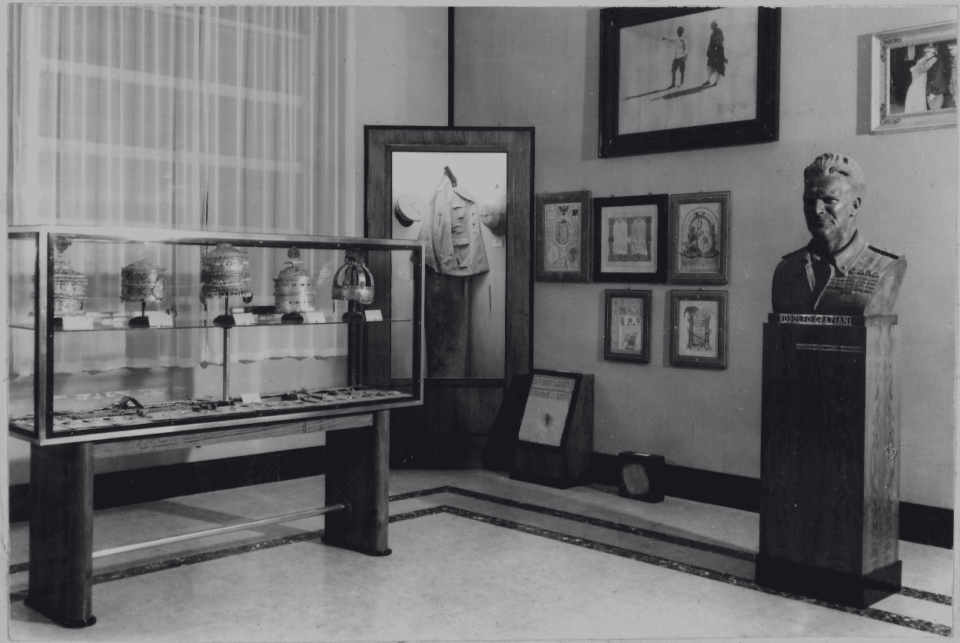Informations sur l’INHA, ses actualités, les domaines et projets de recherche, l’offre de services et les publications de l’INHA.

African Arts during the Second World War: Spoliations, Destructions, Displacements
Archived
| Updated on 22 January 2026
Closed
In conjunction with the program Répertoire des acteurs du marché de l’art en France sous l’Occupation (RAMA), and as part of the research projects initiated by the French National Institute of Art History (INHA) pertaining to the art market and provenances, INHA is organizing a study day titled African Arts during World War II: Spoliations, Destructions, Displacements, on November 13, 2025 in Paris.
Context
Current concerns regarding contentious collecting practices of African cultural property during the colonial era have helped repositioning the arts of Africa as central to the 20th century’s historical stakes and challenges. But what about the period of the Second World War? Deliberate avoidance, lack of interest, or lack of sources, African arts have found themselves to the margins of the history of spoliations, destruction and displacement of works of art during the 1933-45 period, with research largely focusing on European art. At the crossroads of current research on the translocation of works in colonial contexts and that on the looting of cultural goods between 1933 and 1945, the fate of African artworks during the Second World War remains an unthought field of research, that requires a close reading of the archives, between the lines and against the grain.
The aim of this Study Day is to propose a first exploration of this topic, considering the multiple consequences of the war on African artefacts, their displacements, erasures and repositioning – both on the African continent and in Europe. This meeting will provide an opportunity to establish a state of the field, and to identify and bring together researchers with specialized knowledge. The goal is to formulate key questions through a collective and open approach, by proposing a framework that takes into consideration a plurality of perspectives and areas of expertise: art historians, historians, anthropologists, archaeologists, provenance researchers, museum curators, lawyers. The issues at hand are multifold, from the history of collections, to the identification of stakeholders, the translocation of works, and the specific status of African objects in the context of racist theories of fascism.
Conveners
- Yaëlle Biro, Scientific Coordinator, Art Market and Provenance, INHA, Paris, France
with
- Delphine Delamare, Doctoral Student, INHA
- Lola Mirti, Doctoral Student, INHA
Scientific Committee
- Abel Assefa, Director and chief curator, Yimtubezina Museum and Cultural Center, Addis Ababa, Ethiopia
- Cécile Bargues, Pensionnaire, RAMA program manager, Paris, France
- Yaëlle Biro, Art historian, Scientific Coordinator, Art Market and Provenance, INHA, France
- Julien Bondaz, Ethnologist, Laboratoire d’anthropologie des enjeux contemporains, Université Lumière Lyon 2, Associate Researcher, Centre Alexandre Koyré (UMR 8560, EHESS-CNRS-MNHN), France
- Didier Houénoudé, Art historian, Professor, Université Abomey-Calavi, Benin Republic, and Saxony Museums, Germany
- Anne-Solène Rolland, Director of the Department for Heritage and Collections, Musée du quai Branly-Jacques Chirac, France
- Isabelle Rouge-Ducos, Art historian, Mission for the research and restitution of looted cultural properties between 1933 and 1945, Ministry of Culture, Paris, France
- Bénédicte Savoy, Art historian, Professor, Technische Universität Berlin, Germany
- Ibrahima Thiaw, Archeologist, Professor, Université Cheick Anta Diop, Dakar, Senegal
- Esther Tisa Francini, Chief of archives and provenance research, Museum Rietberg, Zürich, Switzerland
Possible themes
- African objects in looted Jewish collections
- Material culture in Africa looted during the war
- (In)Visibility of African objects in World War II archives
- Market players and trade networks for African artworks during the war
- Collections under the bombs, between shelter and destruction
- Repercussions of the war on cultural events in Africa (museology, art and archaeology)
- Specificity of African material culture in the context of the Second World War
- Common problematics between African arts and “degenerate” art
- Double sensitivity, double spoliation of African material culture, between colonial context and Second World War
Abstracts submission
If you would like to participate, please send a 10 lines-abstract as well as a short bio including your title and institution (one paragraph maximum) in French or in English to artsafrique2025@inha.fr.
Deadline for submission: June 1st 2025.
Biography of the Convener
Yaëlle Biro is an art historian, and a specialist of the historical arts of Africa. Her research has focused on African arts’ history of collecting at the turn of the 20th century; collecting practices during the colonial era; taste-making and trade networks; questions of materiality, photography, historiography of African arts, and museology.
From 2010 to 2021, she was curator of African arts at the Metropolitan Museum of Art in New York. Since October 2024, she is scientific coordinator at the French National Institute for Art History (INHA) for research projects related to the art market and provenance.
Notable publications include Fabriquer le regard. Marchands, réseaux et objets d’art africains à l’aube du XXe siècle (Les presses du réel, 2018) and three collective volumes : The Brummer Gallery in Paris and New York: From Antiquity to the Avant-Garde, co-edited with Christine Brennan and Christel Force (Brill, 2023), Rhapsodic Objects: Art, Agency, and Materiality (1700-2000), co-edited with Noémie Etienne (De Gruyter, 2021); and Arts d’Afrique: Histoire et Dynamique, co-edited with Constantine Petridis, to be released in September 2025 in Citadelles & Mazenod’s series “L’Art et les Grandes Civilisations”.